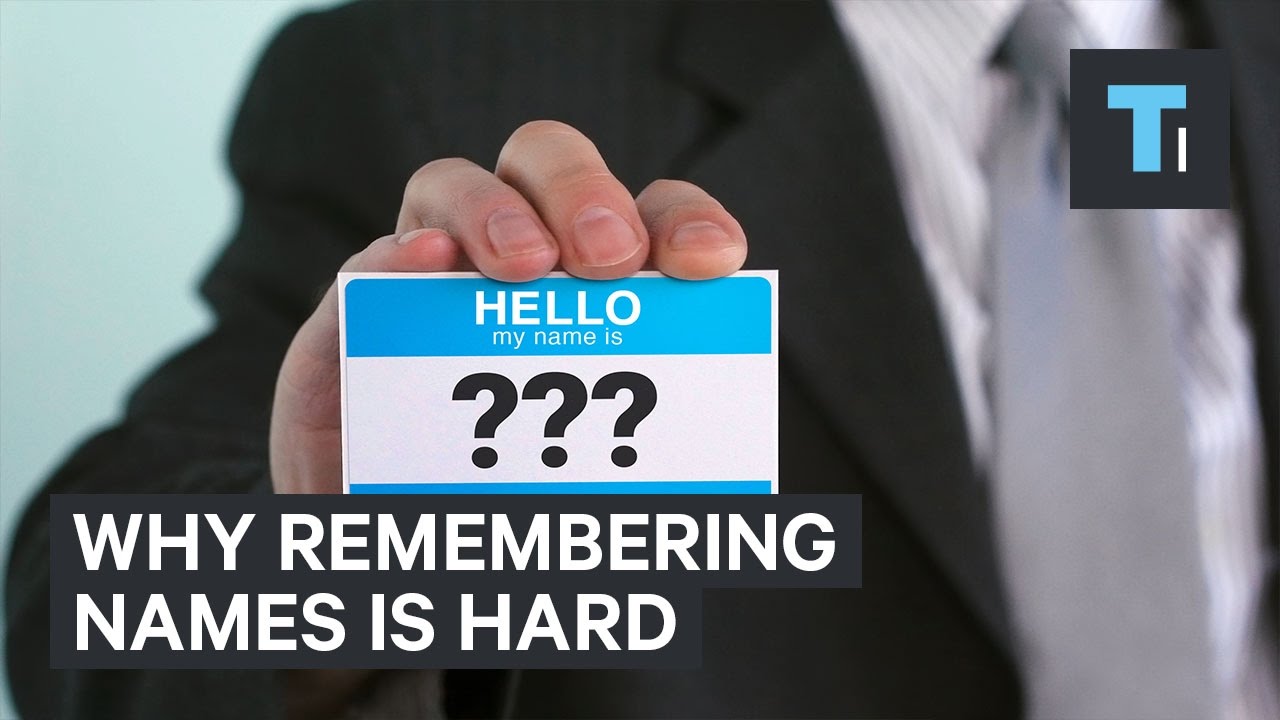I remember on my first day at work in my first job out of college, as I was walking to an orientation session, a senior leader who had interviewed me, stopped me in the hallway. She welcomed me and addressed me by my name. It felt nice that someone so senior, who had met me for just half an hour several months prior, had remembered my name.
Remembering names though is a struggle for many of us. Research shows that most of us have difficulty recalling names, especially when it comes to people we’ve met recently.
So, this week, my message focuses on the importance of remembering people’s names and the various ways in which you can improve your recall.
Does it really matter if you forget someone’s name or get it wrong? Even if you personally think it isn’t a big deal, the fact is that recollecting names plays an important role in social interactions and relationships. Psychologist Devin Ray and his colleagues at the University of Aberdeen found in a recent study that people on the receiving end of such memory failures feel less close to the forgetful person, even if they find the forgetfulness understandable. Paul Bisceglio sums up the damage in Bad News for People Who Can’t Remember Names:
These results…suggest that forgetting someone does indeed send the message everyone seems to fear it does: You simply weren’t interested or invested in that person enough to remember things about them. The impression might be inescapable.
“It’s such a big deal to admit that you don’t remember a person,” says Laura King, a psychologist at the University of Missouri who has separately studied the social consequences of forgetting. “It’s an insult, even though it’s completely innocent and we have absolutely no desire to hurt the person’s feelings.”
Now, imagine these repercussions at the workplace. How would a valued business partner feel if you forgot their name – the most basic information about them? What about a colleague, be it a new team member or someone you’ve interacted with for years? Every time you stumble over their name or apologise for not remembering it (yet again), you’re sending an unintentional signal that they’re not important to you.
For leaders, the skill of remembering names takes on even greater importance. When Herb Kelleher, founder of Southwest Airlines, passed away earlier this year, the company released a newspaper dedication in his honour. The first line read: Dear Herb, thanks for always remembering our names.
Calling someone by their name makes them feel noticed, valued and appreciated. When you take the time to learn and use your colleagues’ names in daily interactions, you bring a sense of caring and warmth into the workplace.
Using people’s names naturally in conversation is a great way to connect with them, strengthen rapport and hold their attention. It makes them feel noticed, valued and appreciated. While studying the “cocktail party effect” in the 1950s, scientist Colin Cherry found that hearing your own name immediately pulls your attention towards the speaker – even if you’re focusing intently on another conversation at the time. Since then, research has continued to confirm that we love to hear our own names.
So, why is it so tough for us to remember new names? Perhaps some of these reasons sound familiar:
1. Lack of attention
In How to Remember People’s Names (Almost) Every Time, Patrick Ewers notes that people don’t generally pay much attention at the start of an interaction:
Too often, we have a tendency to treat introductions as a formality; as precursors to something more important. As a result, we aren’t fully engaged or 100% present during initial interactions.
2. Next-in-line effect
In the Atlantic article, Why Names Are So Easy to Forget, Olga Khazan highlights stage fright as another key reason:
When you encounter a group of strangers with outstretched hands, your mind turns into a scared 9-year-old at the school talent show. You’re not watching the other contestants; you’re practicing your own routine.
You’re preoccupied with making a good impression. Since you’re busy thinking about what to say and do next, you fail to focus on and file away the information being communicated to you in the present.
3. Limited working memory
Your short-term memory, or working memory, has a limited amount of space. It also has lots of gaps, which is why rapidly incoming information often slips out just as quickly. Think about any conversation in which lots of new facts are communicated to you; afterwards, you’ll be able to remember only a few of them.
4. Baker/Baker paradox
Dr. Dean Buonomano, professor of neurobiology at UCLA, explains in this video that our brains aren’t really equipped to memorize random bits of information like names:
Human beings did not evolve to remember people’s names. Indeed the act or the custom of giving each other names is probably relatively recent in evolutionary history…. This is because of the architecture of the brain and how the brain stores memories. And because we’re not very good at memorizing pieces of information that are not linked to other pieces of information.
According to the Baker/Baker paradox, you’re much more likely to remember “baker” as someone’s profession (because your mind has several associated concepts – bread loaves, bakeries, the typical baker’s hat, etc.) than as someone’s name (because that’s just a random fact).
5. Lack of interest
In Jamie Ducharme’s article, Why You Forget Names Immediately—And How to Remember Them, Charan Ranganath, director of the Memory and Plasticity Program at the University of California, Davis says that the simplest explanation is often true:
People are better at remembering things that they’re motivated to learn. Sometimes you are motivated to learn people’s names, and other times it’s more of a passing thing, and you don’t at the time think it’s important.
Enhancing your ability to remember names can, as mentioned above, clearly help strengthen relationships and increase influence at work as well as socially.
Here are six suggestions to improve your recall:
1. Pay attention
When you first meet a new person, commit to the introduction. Don’t start thinking about what you’re going to say next – instead, listen actively and concentrate while they’re introducing themselves. The main reason we don’t remember names is because we’re distracted at this moment.
2. Repeat
Say the person’s name back to them immediately, e.g., “nice to meet you, Jack”. Since repetition lays down the neural pathways you need for recall, saying the name aloud will help you commit it to memory. Use the person’s name a few more times during the conversation. For bonus points, repeat the name to someone else after your interaction, e.g., “I just met Jai from Finance, he joined us last week.”
(By the way, knowing how a name is spelled can increase the chances of future recall. So, go ahead and ask, “How do you spell that?”, especially if the name is unfamiliar to you.)
3. Make an association
The human brain loves patterns and connections, so try to create a link in your mind that will help you remember the person’s name. This could be something public (a celebrity or a film/book character with the same name) or something private (a family member or friend who shares the name). You can also use a rhyming word or a mnemonic device. Any meaningful connection will help the name stick better in your memory.
4. Create a visual
Once you’ve got an association, visualise it. For example, Andrew Budson, in his article How To Remember Names, suggests if you’ve connected your new acquaintance Victoria with Queen Victoria, imagine her wearing a crown and seated on a throne. Keep in mind that your brain is much more likely to remember novel or outrageous images. So, don’t limit yourself to common sense associations – get creative! The sillier the image, the better it’ll anchor in your memory.
5. Study their appearance
Experts recommend taking a mental snapshot of the person while learning their name. Study their appearance and look for features (hair, nose, eyes, jewellery) that set them apart from the crowd. These visual cues will help you connect the name with the face, making it easier to recall when you meet them next.
6. Request repetition ASAP
If you were distracted at the time of introduction or have forgotten the person’s name despite your best efforts, then the wisest thing to do is ask them to repeat it at the first meeting itself. Most people understand it’s difficult to learn names right away, so they don’t mind the request at this stage. The longer you put it off, the more awkward it gets. Imagine asking someone to repeat their name the fourth or fifth time you meet them.
Remembering people’s names is one of the most basic ways of showing that you care. So, try out these techniques next time you meet someone new – or even with existing friends and colleagues whose names you find it tough to recall.









Comments